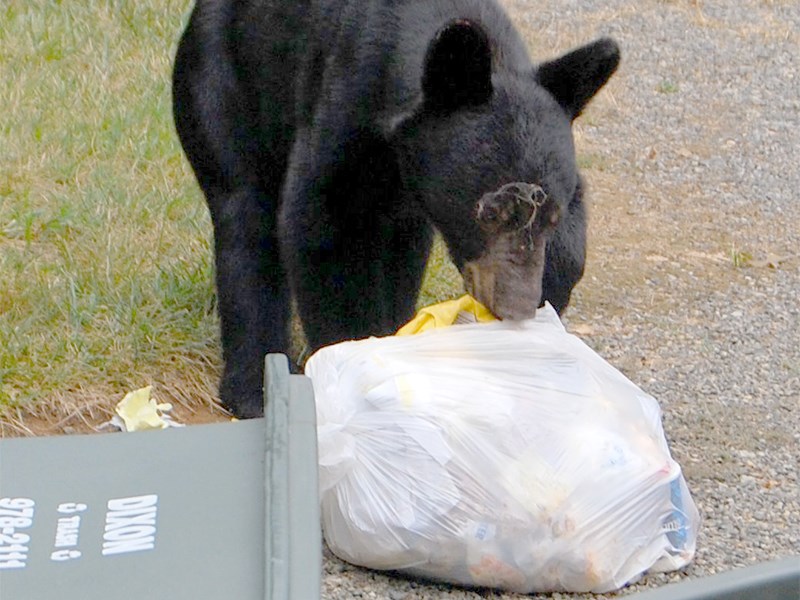Powell River does not have a bear problem; it has a people problem, according to BC Conservation Officer Service officer Andrew Anaka.
A total of six black bears have been destroyed so far this year, and while that number is up over last year, it is still far fewer than the more than three dozen killed by conservation officers during the summer of 2015.
“I don’t believe Powell River has a bear problem,” said Anaka. “What’s killing these bears is people who refuse to deal with the attractants in their backyards.”
Calls have been coming in from around Powell River Regional District reporting bears breaking into storage sheds, climbing up on porches, killing chickens and attempting to break into homes through cat doors.
Powell River WildSafeBC community coordinator Francine Ulmer said there was even a report of a bear opening a car door and tearing open the glove box to get at stored dog treats.
Cedar Crest Road resident Nick Sherris and his family experienced serious property damage earlier this month when a sow with two cubs ripped open the exterior siding of his detached garage to access two bags of stored garbage waiting to be taken to the transfer station.
“We started storing our garbage in the house as much as we could after that, and doing more dump runs,” said Sherris.
Then, on Wednesday, June 21, Sherris went out on an errand and returned to find the bears had broken into his locked house and taken a loaf of bread and a pound of butter from his kitchen.
“The bears came into the house through the back door, ripped the screen door right off the hinges and pushed it open,” said Sherris.
Cedar Crest Road residents have had their share of wildlife conflicts over the years, including deer eating plants, black bears breaking into sheds and wolves attacking family dogs. The strip of about five houses in upper Westview is situated on the town’s boundary with the woods.
Sherris said he waited as long as he could, but after his home was broken into he felt it was time to call for help.
“We waited so long; we didn’t want to call,” he said. “There has to be other solutions than killing.”
Conservation officers wheeled their trailered bear trap to Sherris’ yard and set the trap. Within 20 minutes, the officers were called back and the sow and two cubs were destroyed.
“We destroy bears on a rare occurrence,” said Anaka, “but the public seems to think they are going to call us and we’re going to show up and start shooting.”
Human-bear conflicts escalated in 2015 and this spring berry crops failed to arrive on time, according to Ulmer.
A delay in the salmonberry crop due to a wetter-than-average spring then resulted in increased bear activity she said.
Anaka said the community attracts bears because of all the human food sources in backyards including fruit, garbage, pet food and bird feeders.
Of all calls received by his office, 90 per cent were due to bears knocking over garbage cans left outside or bears in someone’s fruit trees or bird feeders, said Anaka. Those calls usually result in conservation officers providing information about managing attractants, he added.
“It’s one in 10 we have to go out on and deal with a bear because it has become aggressive toward people or is causing serious property damage,” said Anaka.
Sherris said he wishes the conservation officer service could find the budget to remove the bears and transport them somewhere away from humans, so that killing them isn’t the only course of action.
“There has to be other options,” said Sherris. “Everyone is pretty pissed off it had to happen.”
However, according to BC Conservation Officer Service inspector Murray Smith, the money isn’t the issue; it’s that relocation does not work.
The decision to kill the bears has more to do with the fact that they had become conditioned to human-sourced food, said Anaka.
“We simply don’t have any place far enough away from people where these bears won’t return,” said Anaka. “They’ll come back over 100 kilometres to an area they know.”
Dropping bears in a remote part of the woods is also unjust to the bears, who are highly territorial, he added.
“It’s unfair to these bears to dump them into an unknown location where they don’t know how to find food, get beat up by other bears and have to become more aggressive in order to survive,” said Anaka.
According to Ulmer, destroying bears is not solving the problem of wildlife conflicts in Powell River.
“What we’re doing by removing bears from the population through destroying them is just addressing a symptom of a much deeper issue,” she said. “We’re not really getting any long-term solution; just a temporary fix.”
Ulmer said for this reason she has continued to advocate for Powell River to become a Bear Smart community. She added that when attractants are managed better on a community scale the number of bears involved in conflicts and the number of bears destroyed goes down.
“We will always have bears around town,” said Ulmer. “Ideally, we would have not human food sources for them, so when they do wander in they keep moving.”
Anaka added it is often people storing their garbage in what they think is a secure location who end up having encounters with bears. The animals have learned about human food from other people who do not manage their attractants well, he said.
“If two or three residents on a block have those attractants,” said Anaka, “it affects everybody.”



